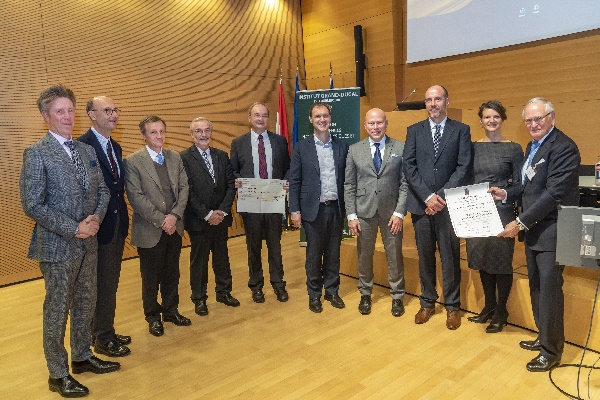
The ninth Grands Prix in Sciences by the Institut Grand-ducal, the Grand Prix 2018 in Biological Sciences was awarded to Paul Wilmes, Associate Professor of Systemic Ecology at the University of Luxembourg.
This year's winner of the Grand Prix, still called the Cactus Award (named after the sponsor) was Mr. Paul Wilmes, Associate Professor of Systemic Ecology at the University of Luxembourg and researcher at the "Luxembourg Centre for Systems Biomedicine". The prize was awarded this past Saturday 17 November 2018 at the Chamber of Commerce of Luxembourg as part of an academic session gathering a hundred people.
The laureate is of Luxembourg origin and did his university training in the UK where he received his doctorate in 2006 from the "School of Environmental Sciences" from the University of East Anglia in Norwich before undertaking part of his research doctoral studies at the Max Planck Institut für Marine Mikrobiologie in Bremen, Germany. After three years of postdoctoral research at the University of California, Berkeley, California, Paul Wilmes continued his scientific career at the Public Research Centre-Gabriel Lippmann (now LIST), as part of a prestigious ATTRACT fellowship, obtained from the National Research Fund (FNR). He then continued as a lecturer-researcher at the Luxembourg Centre for Systems Biomedicine, one of the three interdisciplinary centres of the University of Luxembourg, where he is deputy head of the Systems Biomedicine department and head of the research group "Eco- Systems Biology "(Wilmes Lab).
Fully engaged in biology research, the laureate has participated and continues to participate in numerous international associations, particularly in the field of research on the human microbiome. Having supervised master's students, doctoral students and even postdoctoral fellows, Paul Wilmes has received numerous national and international financial awards thanks to the quality of his research. The members of the Grand Prix jury in question particularly appreciated the quality of his numerous publications, international involvement in research on the microbiome, obtaining of multiple patents and the development of an experimental in vitro device facilitating representative co-culture of human and bacterial cells, called the HuMiX device.








